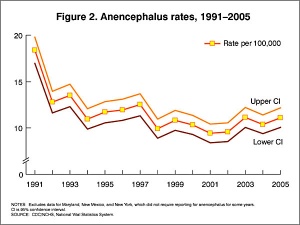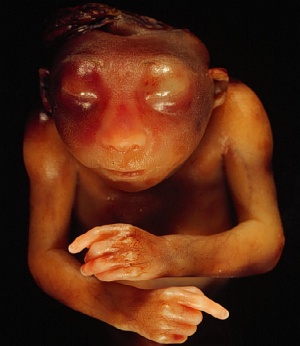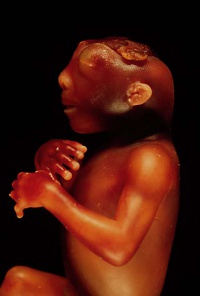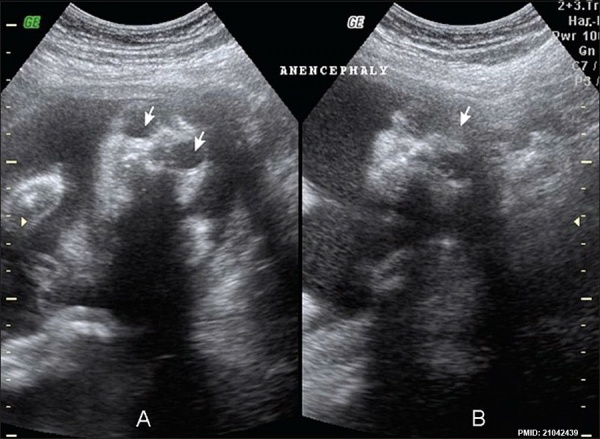Abnormal Development - Anencephaly: Difference between revisions
(Created page with "{{Header}} ==Introduction== File:USA_anencephaly_rates.jpg|thumb|300px|Anencephaly Rates (USA Data)<ref>Mathews TJ. '''Trends in spina bifida and anencephalus in the United...") |
mNo edit summary |
||
| Line 1: | Line 1: | ||
{{Header}} | {{Header}} | ||
=Q00 Anencephaly and similar malformations= | |||
* Q00.0 Anencephaly, Acephaly, Acrania, Amyelencephaly, Hemianencephaly, Hemicephaly | |||
* Q00.1 Craniorachischisis | |||
* Q00.2 Iniencephaly | |||
==Introduction== | ==Introduction== | ||
[[File:USA_anencephaly_rates.jpg|thumb|300px|Anencephaly Rates (USA Data)<ref>Mathews TJ. '''Trends in spina bifida and anencephalus in the United States, 1991-2005''', National Vital Statistics System.</ref>]] | [[File:USA_anencephaly_rates.jpg|thumb|300px|Anencephaly Rates (USA Data)<ref>Mathews TJ. '''Trends in spina bifida and anencephalus in the United States, 1991-2005''', National Vital Statistics System.</ref>]] | ||
| Line 24: | Line 30: | ||
<pubmed limit=5>Anencephaly</pubmed> | <pubmed limit=5>Anencephaly</pubmed> | ||
|} | |} | ||
{| | {| | ||
Revision as of 03:57, 26 May 2018
| Embryology - 16 Apr 2024 |
|---|
| Google Translate - select your language from the list shown below (this will open a new external page) |
|
العربية | català | 中文 | 中國傳統的 | français | Deutsche | עִברִית | हिंदी | bahasa Indonesia | italiano | 日本語 | 한국어 | မြန်မာ | Pilipino | Polskie | português | ਪੰਜਾਬੀ ਦੇ | Română | русский | Español | Swahili | Svensk | ไทย | Türkçe | اردو | ייִדיש | Tiếng Việt These external translations are automated and may not be accurate. (More? About Translations) |
Q00 Anencephaly and similar malformations
- Q00.0 Anencephaly, Acephaly, Acrania, Amyelencephaly, Hemianencephaly, Hemicephaly
- Q00.1 Craniorachischisis
- Q00.2 Iniencephaly
Introduction

A neural tube defect, anencephaly is a failure of the neural tube to close cranially. Also called exencephaly or craniorachischisis.
Some Recent Findings
| More recent papers |
|---|
|
This table allows an automated computer search of the external PubMed database using the listed "Search term" text link.
More? References | Discussion Page | Journal Searches | 2019 References | 2020 References Search term: Anencephaly <pubmed limit=5>Anencephaly</pubmed> |
| Fetal Anencephaly | |
|---|---|

|

|
| ventral view | lateral view |
Ultrasound
Anencephaly in a fetus (GA week 18) from a diabetic mother. Ultrasound images (coronal) show a complete absence of the cranial vault and brain and enlarged orbits.[2]
- Links: maternal diabetes
Historic Anencephaly
These drawings are from a 1921 study of a single embryonic anencephaly.[3]
These drawings are from a 1925 study of 57 cases of anencephaly.[4]
Dodds GS. and Deangelis E. An anencephalic human embryo 16.5 mm long. (1937) Anat. Rec. 67(4): 499-505.
References
- ↑ Mathews TJ. Trends in spina bifida and anencephalus in the United States, 1991-2005, National Vital Statistics System.
- ↑ Alorainy IA, Barlas NB & Al-Boukai AA. (2010). Pictorial Essay: Infants of diabetic mothers. Indian J Radiol Imaging , 20, 174-81. PMID: 21042439 DOI.
- ↑ Frazer JE. Report on an anencephalic embryo. (1921) J Anat. 56(1): 12-9. PMID 17103933
- ↑ Nañagas JC. A comparison of the growth of the body dimensions of anencephalic human fetuses with normal fetal growth as determined by graphic analysis and empirical formulae. (1925) American J. Anatomy. 455-494.
Journals
Journal of Pediatric Neurosciences - is official publication of the Indian Society for Pediatric Neurosurgery.
Search PubMed
Search term: Neural Development Abnormalities | Anencephaly | Hydrocephalus | Encephalocele | Holoprosencephaly | Autism
Glossary Links
- Glossary: A | B | C | D | E | F | G | H | I | J | K | L | M | N | O | P | Q | R | S | T | U | V | W | X | Y | Z | Numbers | Symbols | Term Link
Cite this page: Hill, M.A. (2024, April 16) Embryology Abnormal Development - Anencephaly. Retrieved from https://embryology.med.unsw.edu.au/embryology/index.php/Abnormal_Development_-_Anencephaly
- © Dr Mark Hill 2024, UNSW Embryology ISBN: 978 0 7334 2609 4 - UNSW CRICOS Provider Code No. 00098G








